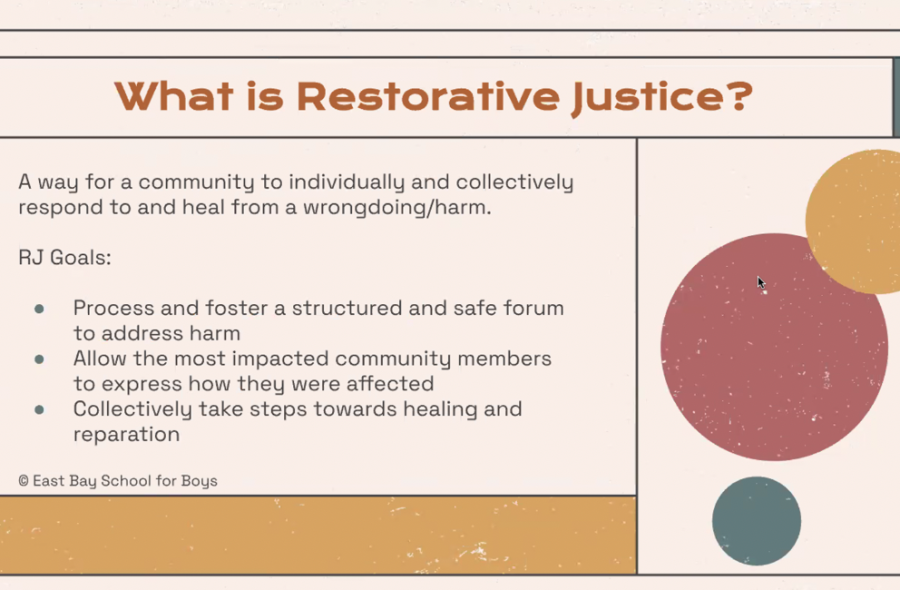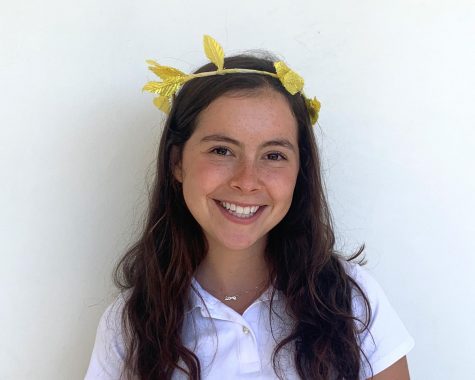‘Approach with the intention to understand’: Administration organizes affinity groups following campus incident
Photo credit: Rose Sarner
Hazell-O’Brien presents on the what restorative justice is during an all school meeting on Jan. 4 via Zoom. This was the first of many meetings in creating restorative accountability.
January 18, 2022
What was meant to be a self-esteem project, where students post sticky notes with positive affirmations on bathroom mirrors, turned into two instances of hate speech. On Dec. 16, Head of School Elizabeth English sent out a community-wide email describing the two incidents that had been posted on the mirrors, as well as the steps being taken in response.
The first instance was reported to school leaders by students who saw a sticky note posted in the bathroom that had the N-word written on it. Through an investigation into the incident, another student came forward informing Archer leaders of another sticky note that had “Jew” written on it. The investigation into both incidents in ongoing, and the school response consisted of affinity spaces, advisory reflections and all-school meetings.
On Tuesday, Jan. 4, Dean of Student Life, Equity and Inclusion Samantha Hazell-O’Brien presented at an all-school meeting on restorative justice, accountability and the first steps the school was taking to reduce the harm of these incidents. One of the first steps was holding affinity spaces designed to support students who were directly impacted by the hate speech
During the all-school meeting on Wednesday, Jan. 4, students shared in the chat new evidence and their reactions regarding the hate speech incident. Hazell-O’Brien asked students to email her with any details they have regarding the event.
Hazell-O’Brien continued her presentation on restorative justice on Jan. 12, where the upper school gathered on Zoom to watch videos about the impact of hate speech on individuals and communities. Further reflection will occur within the community in the coming days.
“I think that the idea of healing and learning how to heal from such an impactful message that was written on a post-it is really important,” co-president of the Black Student Union and member of The Executive Board of Advocacy and Diversity Lexi Tooley (’22) said. “Learning from the experience and how to move forward is really important.”
On Friday, Jan. 14, Fitness and Wellness teacher Dani LeNoir and Hazell-O’Brien led a Black and African American affinity group and history teacher Elana Goldbaum and world language teacher Talia Geffen hosted an affinity group for members of the Jewish community. These were the first affinity groups that were led as a step in healing the community, and all affinity spaces were led by a facilitator. Those who did not attend affinity spaces went to their mentorship to reflect on the incidents.
“We want to encourage young people to bring their emotions into the conversation. How does this make you feel? Why does it make you feel that way?” Goldbaum said. “It’s hard to say how people might be feeling because my reaction is based entirely on my experience, and that’s going to be the same for all of our students. We want to make sure that in these affinity spaces, students are able to either internally or externally process how they’re feeling as well as approach with the intention to also understand.”
The restorative justice plan is a way for the community to individually and collectively respond to and heal from a wrongdoing. The goals of this plan are to provide a structured and safe forum to address harm, and as a community, take steps towards healing and reparation.
“[Students] can always reach out to student leaders because we’re there for them and to help students on campus,” EBAD board member Layla Huber-Verjan (’22) said. “If they ever need anything, I encourage them to reach out.”
Both all-school meetings explained that it is not the job of individuals affected by this incident to educate the community. Administration is taking steps to support individuals affected and provide reflection for the community.
“We don’t ever want to put the pressure to educate the broader community on an affinity group. If a student or a young person wants to engage in that, that’s certainly an avenue we can explore,” Goldbaum said. “We would never want to expect that it’s the job of Jewish students to explain why this term in different contexts can be hurtful.”
The restorative accountability project is not only for students to acknowledge that the hate speech incident happened in their community, but to acknowledge that it also happens in the world too. Hazell-O’Brien said that she hopes to teach students skills in order for them to properly know how to deal with an incident like this in the real world.
“We want the affinity spaces associated with this current restorative accountability to be personally healing but then also have transparency to know that this is an event that has occurred more than likely living in society and having a myriad of experiences,” Hazell-O’Brien said. “It’s an event that’s going to occur again in our students’ lives.”
Affinity spaces have been offered at Archer in the past for groups of people to openly reflect on current events, whether it is a hurtful experience or celebration. However, more affinity spaces and alliance meetings will take place moving forward. While the first affinity spaces in response to the hate speech incident focused on those directly impacted, more will take place to include different identities, as well as all-school meetings as Archer widens the scope to the larger community.
“Archer itself is like an affinity space. It gives that feeling of community and that you’re not alone,” Goldbaum said. “There are other people who might be feeling the same thing, other people who have a shared identity have similar questions or similar feelings.”
The restorative justice plan is an ongoing project that Hazell-O’Brien will continue to present to the Archer community as a step moving towards healing. The goal of these steps is to help create an intentional and meaningful path towards healing and repair.
“I think that like everything, it’s a process. I’m excited for reflection along the way of what’s working and what needs to be tweaked. What are things that we can know?” Goldbaum said. “What are things that we can celebrate, but also what are some things you need to examine a little bit further? That is a process that is never-ending.”
Correction Statement (Jan. 26, 2022, 1:11 p.m.): The article has been updated to now attribute Goldbaum for a quote that was original credited to Hazell-O’Brien.










